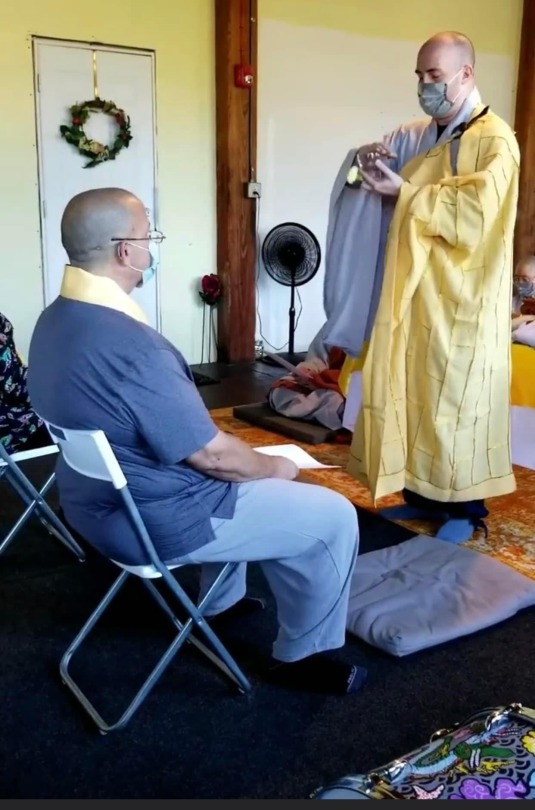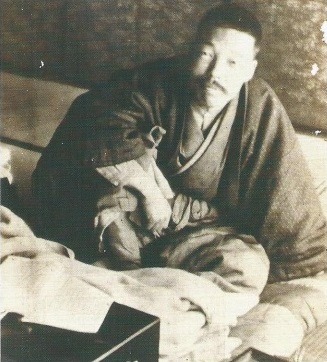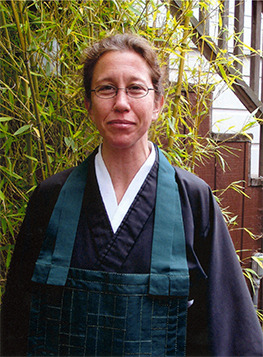#Kyogen Carlson
Photo

Call of the Sea.
Mascagni Terrace,
Livorno,
1958
Michele Vestrini.
* * * *
Find Your Boundaries
If someone does not recognize how they have harmed you, there’s no point in forgiving them, but you can let go of your own bitterness about it. You don’t have to pretend like it never happened. You learn from it. You figure out how to hold your boundaries.
—Kyogen Carlson, “When Ghosts Come Back to Haunt Us”
[alive on all channels]
#Kyogen Carlson#When Ghosts Come Back To Haunt Us#Call of the Sea#Livorno#Michele Vestrini#quotes#Alive On All Channels
28 notes
·
View notes
Text
On Zen, Severity, Affect, and Sacrifice
There is much talk and ado in the wider Zen world these days concerning the necessary “severity” of training, the proper affectation of Zen adepts, the sacrifices one must make in pursuit of realization and the like. In short, a lot of machismo.
In the face of this, I’m struck by the words of the late Kyogen Carlson Roshi who was keen to note that he learned from his own teacher that you could abuse a trainee into awakening, and that more importantly, you shouldn’t.
In the schools I’m trained and authorized in, we realize that life is intrinsically “severe” enough, that folks’ commitment to training (while being somewhat open to nurturing and nudging by a teacher) is essentially commensurate with the degree of unsettling and curiosity (in the sense of profound questioning) that life has rendered them.
We recognize that the only proper affectation of a Zen adept is that which is revealed organically as their true face shines through according to their own paccaya, and that ultimately if our training isn’t moving us toward a sense of dynamic centeredness, marked with spontaneous joy, and light hearted equanimity something somewhere is stuck.
And while ultimately, full Zen training does demand that we pass everything through the great forge of concentrated awareness, and in this that likely much will burn away in the process of revealing but the enduring companions of our original face, the efficacy or legitimacy of such sacrifice has no universal outward meter or measure.
Zen training is a deeply personal matter, and in a real sense, a deeply personalized matter between a teacher and a trainee. There are no master formulas to touch every heart-mind, nor methods fit for every case. There is but the intrinsic wisdom confirmed in disciplic succession that can apply to many but not all situations and circumstances. Awakening, after all, has nothing to do with omniscience, omnipotence, and omnipresence.

~Sunyananda
#zen#buddhism#buddha#buddhist#dharma#enlightenment#sangha#awakening#nirvana#spirituality#peace#religion#love#liberation#spiritual#joy#spirit#happiness#meditation#moksha
1 note
·
View note
Text
Taking the Path Seriously
There has been a lot of criticism towards Buddhists about "NOT TAKING THIS SHIT SERIOUSLY".
I remember reading a blog about a woman who went to a Dharma Center, and listen to one of the monks, perhaps the teacher, talk about the monk's life and how it was a life of renunciation of worldly ways. She was very inspired and happy to hear that a person could do that.
Later, she was walking alone and saw the very same monk with an iPhone watching videos like any Person in the Worldly-ways would do. She was distraught, her faith smashed, and her spiritual inspiration vanquished.
Original Buddhism to become a bhikkhu is a serious and solemn promise to the path. The person who wants to walk the path is given a funeral, they are then shaved off all hair, stripped of all clothing and jewelry, and bid "good bye" to the world. They then walk naked to the funeral grounds to find a discarded mortcloth (funeral cloths used to carry the dead) to fashion a robe from. They return to the Sangha as reborn as The Monk with a new name.
The Bhikkhu owns nothing, cannot own anything. Even the bowl they eat from is not theirs, and it used to be they ate off of leaves or discarded broken pottery and other household dishes.
227 rules the Bhikkhu must know and do their best to adhere to. Gross and intentional violations of the rules can result in expulsion from the Bhikkhu Sangha.
Back in the day, there were no "temples" for the monks to sleep in. They walk from town to town, from city to city to beg for alms, to spread the words of Buddha to whom would listen.
The Bhikkhu is not there to do 'Good Deeds' such as feed the homeless, build shelters, or solve society's problems. They are there for one purpose, to end the cycle of rebirth and thus reduce the suffering in this phenomenal existence.
The Zen monk is a Bhikkhu under the Dharmaguptaka Vinaya, different than the Theravadan Bhikkhu, however, the same concept applies: They DIE TO THE WORLDY WAYS OF MEN.
In my travels, I have talked to Zen Monks and Zen priests. There is a difference! In Japan, the Zen Priest is a temple minister (much in how a Christian minister is here in the USA) and the temple is in his family's possession and he is expected to produce an heir who will take over the temple. Though the temple priest may have gone through traditional Monk training, they are not considered Monks in the normal sense and are not expected to follow the Dharmaguptaka Vinaya. This however is not the case for actual Zen monks who live in the Monastic compounds where they ARE EXPECTED TO FOLLOW THE Dharmaguptaka Vinaya to the letter.
In my own Zen Buddhist training, we talked a lot about being a MONK, and Dharmaguptaka Vinaya. The head monks would discuss the fact that the Japanese Temple Priest and the Zen Monk are two different things, and that what we know in the west is mostly the Temple Priest, rarely do we know or see the actual Zen monk.
A friend of mine, Martin Huges, when to Japan to become a Rinzai monk. He spent 3 years living in the Rinzai monastery, lived as a Real Zen monk following the Dharmaguptaka Vinaya, going on alms rounds, and attending all of the required events. Through the friendship of a fellow Japanese monk in training, whose father was a temple priest, he was allowed to become a Zen Priest in one of the sub-temples that the family owned. He noted that being a Priest was very different: Can watch TV, drink alcohol, and be introduced to girls as potential wives. Unfortunately, Martin passed away due to a meningitis infection he picked up while on a missionary event in the Philippines.
My first teacher Kyogen Carlson often talked about the confusion between the Zen Priest and the Zen Monk. He trained as a monk and followed the Vinaya, but later due to circumstances became a Temple Priest. He talked a lot following the Dharmaguptaka Vinaya as a Zen Monk while he trained at Shasta Abbey with Roshi Kennett. In his talks, he would bring up that what he is doing now, THE ZEN PRIEST, is not the same as THE ZEN MONK.
When I went to the San Fransico Zen center for further training because Shasta Abbey was not available for me to train in, the confusion between the Priest and the Monk was great, and a lot of blurring the two district paths together happened. This confusion I saw created a lot of suffering, to the point of people quitting the path, losing faith and belief, even so disillusioned to commit suicide (yes that happened).
Today, 25 years later, I see this confusion as contagious and has spread to all of the Zen Dharma Centers. When I ask ordained MONKS at these Dharma Centers and Monastic training places about the following Vinaya, I am told they just follow the Bodhisattva precepts and that the Vinaya is Hinayana and NOT OUR PATH. YIKES! Now I understand why Zen has become so wishy-washy and corrupted to be something that it never was.
Honestly, the Zen Dharma Centers always has been a recruitment center for Monastic Life, because that is what Buddhism is about - renunciation of the world. Laymen are just supporters of the Monastic Monks who follow the Dharmaguptaka Vinaya, and gain spiritual merit by doing such. Lets face it, not everyone is cut out to be a renunciate. I knew a guy who wanted to be a monk, but he was caring for her mother full-time. Another lady had children she had to care for, and many young people said that perhaps in the future they will pursue this NOBLE PATH.
That is what the Zen Center is about, to encourage people to seek the path of Renunciation. Not to become a social hub, a political activist group, or a Lay lineage of Priest (like the Methodist churches)
As Roshi Kennett wrote, 'Every person who renounces the world lessens the sea of suffering for all beings'. She understood what Buddha taught and why the Buddhas path is the way it is. There is no middle ground, there is no compromise.
It is my sincere hope that we as a Zen community of Monks, Priest, and Laymen can clear up the confusion and return to the Path that Buddha set forth in the sutras to achieve the Liberation he preached about.
0 notes
Photo

Mente que procura o caminho Quando uma semente brota, ela o faz no escuro, embaixo do solo, onde fica úmida. Sem falta, o broto sobe e a raiz desce. Ele faz isso sem nenhum estímulo externo além da gravidade e do calor da terra. A motivação é inata na própria semente. A verdadeira aspiração e toda a prática real vêm deste mesmo lugar. É intrínseco e, da mesma forma que a grama tem o poder de quebrar o concreto e estilhaçar rochas, pode estilhaçar a energia do hábito e deslocar toda a Terra. Essa aspiração, ou Mente que Busca o Caminho - brotando desse lugar intrínseco apesar das condições - vai destruir nossas falsas concepções e é a única coisa que pode realmente mudar o mundo. Kyogen Carlson, no livro You Are Still Here: Zen Teachings of Kyogen Carlson, editado por Sallie Jiko Tisdale #zen #zazen #sotoshu #bodaishin #bodaimind #despertar #mentedesperta #buddhism #budismo #zenbuddhism #zenbudismo #budismozen #pazinterior #meditação #autoconhecimento #sabedoria #compaixão #compassion #espiritualidade #spirituality #ética #ethics #sotozen #estilodevida #budismoengajado #yakusan #mongeyakusan #omédicoeomonge https://www.instagram.com/p/CTE-GW8gxRU/?utm_medium=tumblr
#zen#zazen#sotoshu#bodaishin#bodaimind#despertar#mentedesperta#buddhism#budismo#zenbuddhism#zenbudismo#budismozen#pazinterior#meditação#autoconhecimento#sabedoria#compaixão#compassion#espiritualidade#spirituality#ética#ethics#sotozen#estilodevida#budismoengajado#yakusan#mongeyakusan#omédicoeomonge
0 notes
Text
Kyogen Carlson
#nohgaku #kyogen [Oregonian]Carlson, Kyogen 65 Oct. 08, 1948 Sept. 18, 2014 Our deeply beloved abbot, teacher and friend, Roshi Kyogen Carlson, died unexpectedly Sept. 18, 2014, of a massive heart attack. He was a few weeks …
0 notes
Text
Kyogen Carlson
#nohgaku #kyogen [Oregonian]Carlson, Kyogen 65 Oct. 08, 1948 Sept. 18, 2014 Our deeply beloved abbot, teacher and friend, Roshi Kyogen Carlson, died unexpectedly Sept. 18, 2014, of a massive heart attack. He was a few weeks ...
0 notes
Text
On Segaki
On Segaki and the afterlife...
by Kyogen Carlson
Next to Jukai, which comes every spring, Segaki is the most important festival on our calendar. The name “Segaki” means “feeding the hungry ghosts,” and the rituals and practices done for this festival contain a great deal of teaching about training in Buddhism. On one hand Segaki is a time for remembering the dead and resolving our karmic connections with those who have died,…
View On WordPress
0 notes
Text
Kyogen Carlson, co-abbot of Dharma Rain Zen Center, dies of heart attack at 65 (Sept 18, 2014)
Kyogen Carlson, co-abbot of Dharma Rain Zen Center in Portland, Oregon (alsongside his wife, Gyokuko Carlson), died suddenly this morning of a massive heart attack. On his way to oryoki he collapsed and was then rushed to the hospital, where he eventually died. He was 65 years old.
This is very sudden news, as death always is, and so it is a reminder of how little time we have here in life.
We think we have it, but really we do not.
I will always personally be grateful for him helping to fund the production of the documentary film I’ve been working on, Zen in America. I wish I had gotten up there to Oregon before this, as I’d have loved for him to be in this film. What a loss for the Zen community! Our condolences to his family and immediate sangha, and to all of the many lives he touched over the years. May your practice be strong in your grief.
You can read an interview Kyogen did with Sweeping Zen in 2012 that is available here.
Please, appreciate your life, as Maezumi roshi used to say. Our time is so finite and we focus on so many of the things that divide us, rather than bring us together.
1 note
·
View note
Text
Kyogen Carlson: Bridge-Builder over Troubled Waters
#nohgaku #kyogen [Patheos]Zen Buddhist priest Kyogen Carlson (1948-2014) was a bridge-builder. He built bridges of understanding and respect over the dirty, murky, troubled waters of our nation’s culture wars. It is a deep …
0 notes
Text
Kyogen Carlson: Bridge-Builder over Troubled Waters
#nohgaku #kyogen [Patheos]Zen Buddhist priest Kyogen Carlson (1948-2014) was a bridge-builder. He built bridges of understanding and respect over the dirty, murky, troubled waters of our nation’s culture wars. It is a deep ...
0 notes
Text
Missing Kyogen Carlson and His Dharma
#nohgaku #kyogen [Patheos]At my Zen Center last Sunday we read and discussed a beautiful teaching from Kyogen Carlson, one of my Zen teachers. It was from the chapter “Dharma Realm” in a little booklet Kyogen wrote called Zen …
0 notes
Text
Missing Kyogen Carlson and His Dharma
#nohgaku #kyogen [Patheos]At my Zen Center last Sunday we read and discussed a beautiful teaching from Kyogen Carlson, one of my Zen teachers. It was from the chapter “Dharma Realm” in a little booklet Kyogen wrote called Zen ...
0 notes
Text
Kyogen Carlson Roshi, “Notes on Zazen Practice”
#nohgaku #kyogen [Patheos]I’ve been thinking about the various comments about Zen meditation I’ve seen around the inter webs. Some of those comments are quite helpful. Some are beautiful and provide authentic direction for peo…
0 notes
Text
Kyogen Carlson Roshi, “Notes on Zazen Practice”
#nohgaku #kyogen [Patheos]I’ve been thinking about the various comments about Zen meditation I’ve seen around the inter webs. Some of those comments are quite helpful. Some are beautiful and provide authentic direction for peo...
0 notes
Text
Kyogen Carlson Roshi, “Notes on Zazen Practice”
#nohgaku #kyogen [Patheos]I’ve been thinking about the various comments about Zen meditation I’ve seen around the inter webs. Some of those comments are quite helpful. Some are beautiful and provide authentic direction for peo…
0 notes









